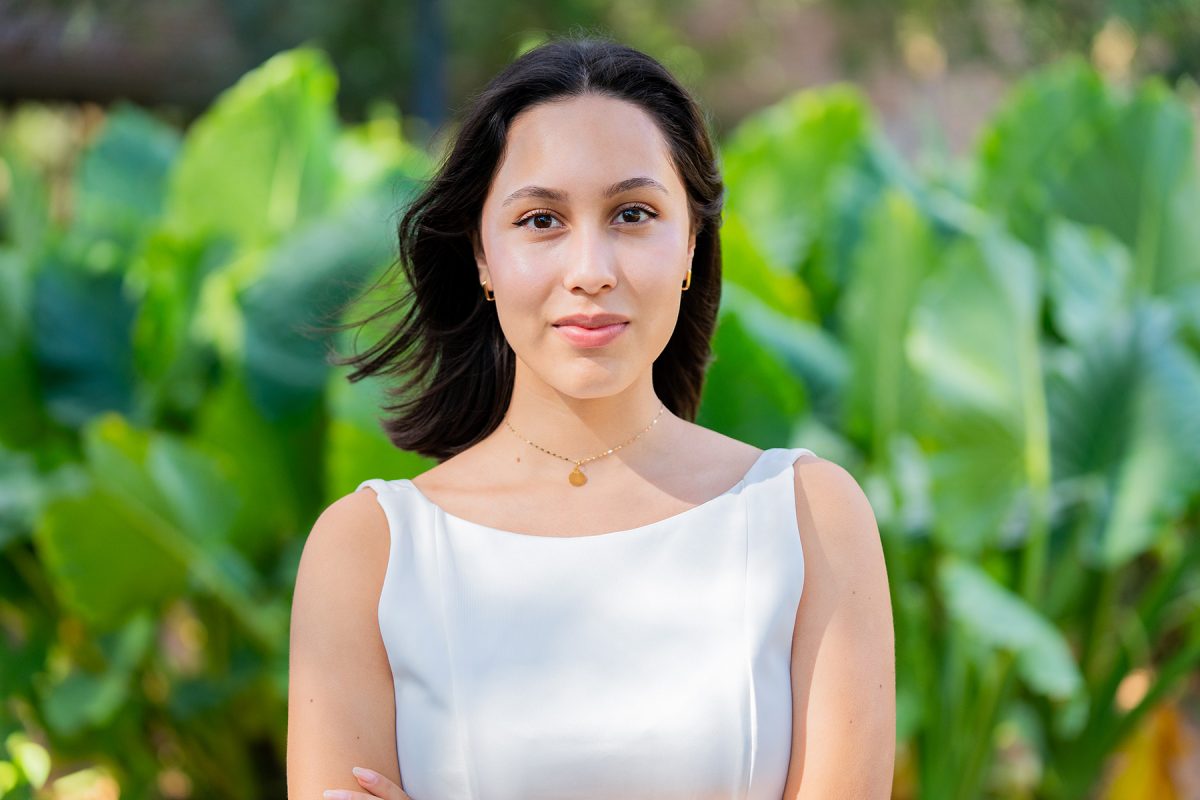
“As a Mexican immigrant, I want to contribute to my community and help ease the adaptation process for others.”
Fast Facts
- Artsy: Knows how to sew and embroider
- Coffee lover: Learned about coffee production in Mexico
- Favorite study spot: Strozier Library
- Bookworm: Favorite book is “El invencible verano de Liliana” by Cristina Rivera Garza
- Thrifty: Started thrifting at 15
Arantza Caudillo Alvarez’s time at Florida State University has been shaped by her experience as an immigrant and her desire to bring more awareness to the experiences of people in the Global South.
She is an intern at the Center for the Advancement of Human Rights (CAHR), an FSU organization that aims to help advance the human rights movement by fostering scholarship at the university and supporting non-governmental organizations that engage in such work. There, Caudillo Alvarez translates legal documents and completes immigration applications.
Caudillo Alvarez is president of After They Arrive (ATA) a student-led organization dedicated to easing the resettlement process for refugees and immigrants in the Tallahassee area. Through ATA, Caudillo Alvarez organizes community events with local organizations to create a supportive community that promotes successful integration into life in Tallahassee.
She is also involved in the Honors in the Major Program and has received grants, including the IDEA Grant and the Social Science Scholars Program grant. Her research focuses on gender-based violence against Indigenous women in rural Mexico and their resilience strategies. She aims to highlight human rights violations in the Global South.
Why did you choose Florida State University?
I chose to attend FSU because of its brick campus, green spaces and its vibrant student life. However, its central location and FSU’s relationship with Florida’s government and Legislature weighed the most in my decision. I am passionate about social justice and community change, and I believe that proximity to these institutions allows me to participate in activities related to my interests and work for effective change.
What academic achievement are you most proud of?
My Honors in the Major thesis on the reconfiguring social roles of Indigenous Otomi, Tepehua and Nahua women and their violent experiences is one of my most significant achievements at FSU because I contributed to the literature of a region overlooked for centuries. I lived in the Otomi-Tepehua region in the state of Hidalgo for three months, in the municipality of Tenango de Doria, which has limited resources and infrastructure. I interviewed 25 women who spoke or identified as Otomi, Tepehua or Nahua, the three ethnic groups in the region. I also worked with an organization called PSYDEH, which focuses on the psychology and human rights of Indigenous women in Mexico. I traveled with PSYDEH to nine communities every week to meet with Indigenous women, facilitate workshops and help the artisan cooperatives. I met dozens of people who taught me about indigeneity and rural life. I hope my research project places Indigenous voices at the forefront and in equal standing in an international arena to develop sustainable change in the region.
How has being at FSU helped you with your research?
My research project is a culmination of my academic achievements. I have received support from faculty members and scholarship programs. As a dedicated student with a 3.9 GPA, I prioritize building relationships with my professors. So, when I decided to pursue a thesis, I had the support of Joseph Hellweg, associate professor in the Department of Religion; Christina Owens, associate professor in the University Honors Program; Juan David Irigoyen, scholarship director for the International Affairs program; and Anasa Hicks, associate professor in the Department of History. Their guidance allowed me to develop strong research proposals and methodology and obtain funding from the university. I received grants from the Social Science Scholars Program, the IDEA Grant program and the International Study Program. Florida State University’s faculty and programs supported my research endeavors and my passion for social change for women in the Global South.
How is your community service affected by your experiences as an immigrant?
I center my community service and leadership efforts around immigration and refugee work. As a Mexican immigrant, I want to contribute to my community and help ease the adaptation process for others. I pursue this work as an intern at the Center for the Advancement of Human Rights and as the president of the registered student organization After They Arrive. At the CAHR, I fill out immigration applications and perform legal translations. As president of ATA, I organize community service events, collaborating with local non-profits to aid in the sustainable adaptation of immigrants in the Tallahassee area. My thesis, internship and role as president of a student organization encompass community service and improving local communities. I hope my research will prompt more academic research in the region, pressure government officials to fulfill their citizens’ needs and bring Indigenous voices and struggles to the forefront of the international arena. As an intern at CAHR, my work contributes to the successful resettlement of hundreds of families so they can call Tallahassee home. My role as president of ATA allows me to make Florida State University a more welcoming space for migration issues and serve as a liaison between students and community service work.



